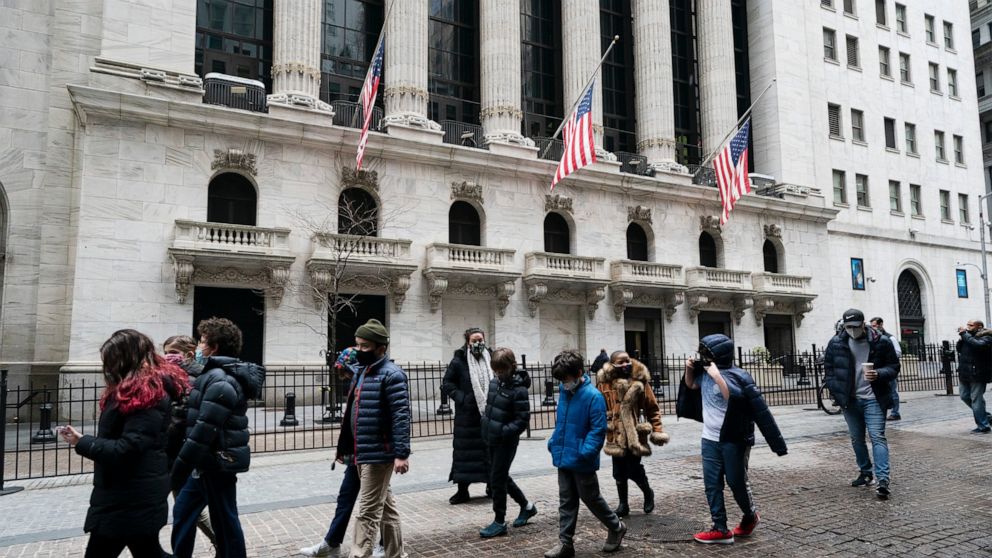Stocks start mostly lower on Wall Street; GameStop surges
BEIJING — Stocks are off to a mostly lower start on Wall Street, led by drops in several big technology companies, while bond yields marched steadily higher as traders anticipate greater economic growth and more stimulus from Washington. The S&P 500 slipped less than 0.1% in the early going Thursday, in line with declines in other indexes. Investors turned their focus to another wild surge in GameStop and a handful of other stocks favored by online investors. The money-losing video game retailer soared another 50% in early trading, after more than doubling in the last hour of trading a day earlier.
THIS IS A BREAKING NEWS UPDATE. AP’s earlier story follows below.
BEIJING (AP) — Global stock markets followed Wall Street higher Thursday after the Federal Reserve chairman said the U.S. central bank is in no hurry to withdraw support for the economy.
London and Frankfurt rose in early trading. Shanghai, Tokyo, Hong Kong and Seoul closed higher. U.S. futures were mixed.
Overnight, Wall Street hit a new high after chairman Jerome Powell said the Fed sees no sign inflation might rise out of control. That helped to dampen fears sparked by a rise in U.S. Treasury bond yields, an indicator of inflation sentiment, that rising price pressure might lead the Fed to raise interest rates.
“Powell has again been pouring oil on troubled markets,” said Robert Carnell of ING in a report. “But the Fed still has communication issues over its future policies which could emerge as a tantrum some way down the line.”
In early trading, the FTSE 100 in London rose 0.3% to 6,680.06 and Frankfurt’s DAX added less than 0.1% to 13,985.53. The CAC 40 in Paris advanced 0.4% to 5,819.27.
On Wall Street, the future for the benchmark S&P 500 index was off less than 0.1% while that for the Dow Jones Industrial Average rose 0.2%.
On Wednesday, the S&P 500 added 1.1%. The Dow climbed 1.4% and Nasdaq Composite picked up 1%.
In Asia, the Shanghai Composite Index rose 0.6% to 3,585.04 and the Nikkei 225 in Tokyo gained 1.7% to 30,168.27.
The Hang Seng in Hong Kong advanced 1.2% to 30,074.17 after the territory’s government promised more coronavirus aid and forecast economic growth of at least 3.5% this year.
The Kospi in Seoul added 3.5% to 3,099.69 after the Bank of Korea left interest rates unchanged and forecast 3% annual economic growth.
Sydney’s S&P-ASX 200 was 0.8% higher at 6,834.00 and India’s Sensex gained 0.8% to 51,181.85. New Zealand retreated while Southeast Asian markets advanced.
Global stock prices have soared over the past six months on hopes for a coronavirus vaccine and central bank promises of abundant credit to support struggling economies. Those sentiments have faltered due to warnings the rally might be too early and that inflation might rise, prompting central banks to pull back.
On Wednesday, Powell affirmed the Fed’s policy commitment in a second day of testimony to legislators in Washington.
The central bank earlier indicated it would let the economy “run hot” to make sure a recovery is well-established following the deepest slump since the 1930s. Powell said it might take more than three years to hit the Fed’s target of 2% inflation.
On Thursday, the yield on the 10-year U.S. Treasury note, or the difference between the market price and what a buyer would be paid when it matures, widened to 1.42%, the highest in just over a year. That indicated investors were moving money out of bonds, a sign they expect inflation to rise, which would reduce the value of the payout.
Powell told the House Financial Services Committee the Fed was in no hurry to raise interest rates or trim its $120 billion in monthly bond purchases, which pushes down interest rates by making more money available for lending.
In Asia, governments aside from China “should more or less follow the Fed in a patient ‘wait-and-see’ mode in the near future,” said Alex Wolf of JP Morgan Private Bank in a report this week. “This could be a further tailwind to growth this year.”
Investors also are looking for Congress to approve President Joe Biden’s proposed economic aid plan. That includes $1,400 checks to most Americans. However, the plan faces staunch opposition from Republicans and is still subject to negotiations.
In energy markets, benchmark U.S. crude gained 51 cents to $63.73 per barrel in electronic trading on the New York Mercantile Exchange. The contract rose $1.55 on Wednesday to $63.22. Brent crude, used to price international oils, added 56 cents to $66.74 per barrel in London. It advanced $1.67 the previous session to $67.04.
The dollar rose to 106.08 yen from Wednesday’s 105.95 yen. The euro rose to $1.2199 from $1.2148.
![]()


